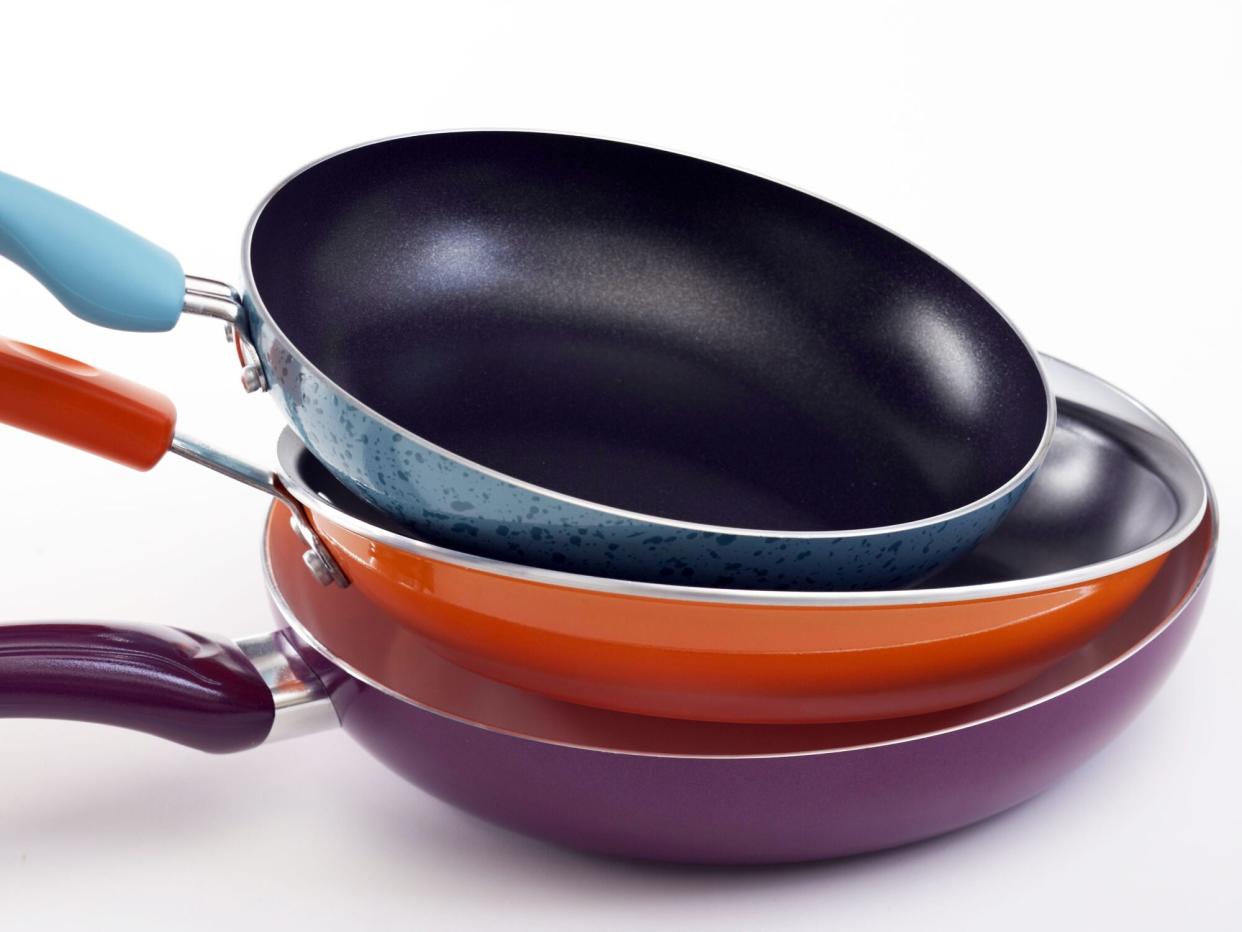How to Extend the Life of Your Nonstick Cookware

Dotdash Meredith
Nonstick cookware is the workhorse of many home kitchens. It is inexpensive, versatile, and easy to use. But while there are no hard and fast rules for use and care (like the ones with cast iron cookware), treating nonstick cookware right can go a long way towards helping it go the distance. If you want your nonstick cookware to stay in top form longer, here's what you need to do to extend its life.
Pick the Right Material for Your Pans
Nonstick pans are not all created equally. They come in a variety of different materials, each with their own pros and cons. These materials include options like ceramic and even porcelain, but these are pretty delicate and may chip, scratch, or even break with heavy use.
Teflon is known to be a durable nonstick coating option, as is stone. But Teflon can scratch easily, and it will lose its nonstick abilities rapidly if it is scratched.
Some nonstick pans are a mixture of materials so you can get the best of several kinds. For example, you may find a pan that has a ceramic interior and stone exterior, for example.
Treat Your Pans Gently
If you take nothing else from this article, remember this: Always use the correct utensils.
"Only use soft utensils like wooden spoons and rubber/heatproof spatulas," says Ann Ziata, chef at the Institute of Culinary Education.
The reason for this is quite the head scratcher. Literally. Metal utensils will scratch away the nonstick coating. Scratches and chips in the coating can quickly turn to stuck-on food (and that pan is no longer nonstick!). It's also how pans get burned and ruined.
Stick to soft surface cooking utensils such as wooden spoons, silicone spatulas, nylon, or even plastic. Using these alternatives will prolong the life of the pan and keep it nonstick longer.
Avoid High Heat
Nonstick pans are made to be used over a medium heat. If you want to use high temperatures, pull out the cast iron—it can handle it. But with nonstick cookware, high heat can actually peel the coating from the body of the pan.
Look for nonstick cookware that is hard-anodized or has an aluminum body, as this will be more resistant to higher temperatures. But still, over time, it can be an issue, and extreme high heat will shorten a nonstick pan's lifespan.
"Avoid extended high heat cooking on the stove and never put a nonstick in a broiler," Ziata says.
Beware of Certain Ingredients
Just as high heat recipes can be dangerous for nonstick pans, so can too much of certain acidic ingredients, such as tomatoes, limes, or lemons.
"Extended use of acidic ingredients can also cause the nonstick coating to break down," Ziata says.
Another ingredient to avoid is cooking sprays and cooking oils that have low smoke points. This is quite simply because oils with low smoke points, like olive oil, can burn and damage the cookware's surface. A better bet is cooking oils with a high smoke point, such as canola, avocado, or coconut.
Related: When to Throw Away Nonstick Pans
Clean Nonstick Cookware With Care
Dishwashers make life easier, but they are not always the best choice for all your cookware. Even if a nonstick pan is labeled dishwasher-safe, that doesn't mean it's the best idea for the pan's lifespan or durability.
The high heat and intense water pressure, much like high stove temperatures, can separate the coating from the pan and cause flaking. The dishwasher won't ruin pans immediately, but it will over time.
The best bet is to always hand wash nonstick pots and pans. And before washing it, let it cool down. Putting cold water on a hot pan can cause warping.
"Use a soft sponge to clean and avoid scrubbing the nonstick surface with abrasive materials. Hand wash all nonstick cookware; avoid using a dishwasher and dry with a towel," Ziata says.
If a nonstick pan has a lot of burnt buildup, use baking soda to loosen it up: Mix a teaspoon of baking soda with just enough water to form a paste. Then, take a soft sponge, and rub out that burnt-on food and residue until it is removed.
Store Nonstick Cookware Properly
Caring for cookware does not end with cooking and cleaning. How you store it also matters and can extend the life of our nonstick cookware.
"Place a shelf liner or towel on top of the nonstick surface if you are going to stack other cookware on top," says Ziata, who explained this will protect the nonstick layer from getting scratched by the bottoms of the other pots and pans. You can also store nonstick pans hanging up.
Treat nonstick cookware right, and it can last for a long time. That will save you time, effort, and money—and make sure you have reliable pans in good standing to fry those eggs and sauté those vegetables for years to come.
Related: 5 Mistakes You Should Never Make With Nonstick Cookware

